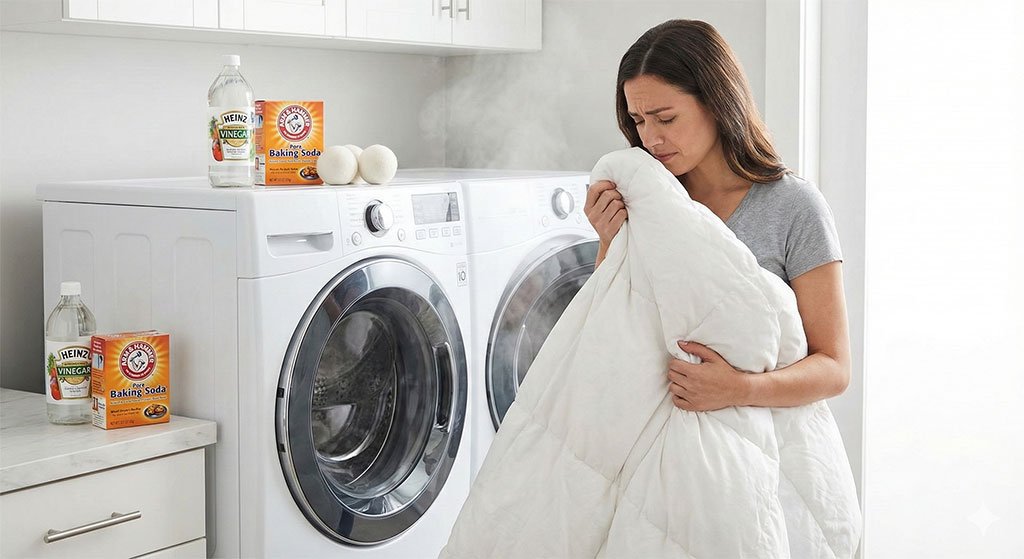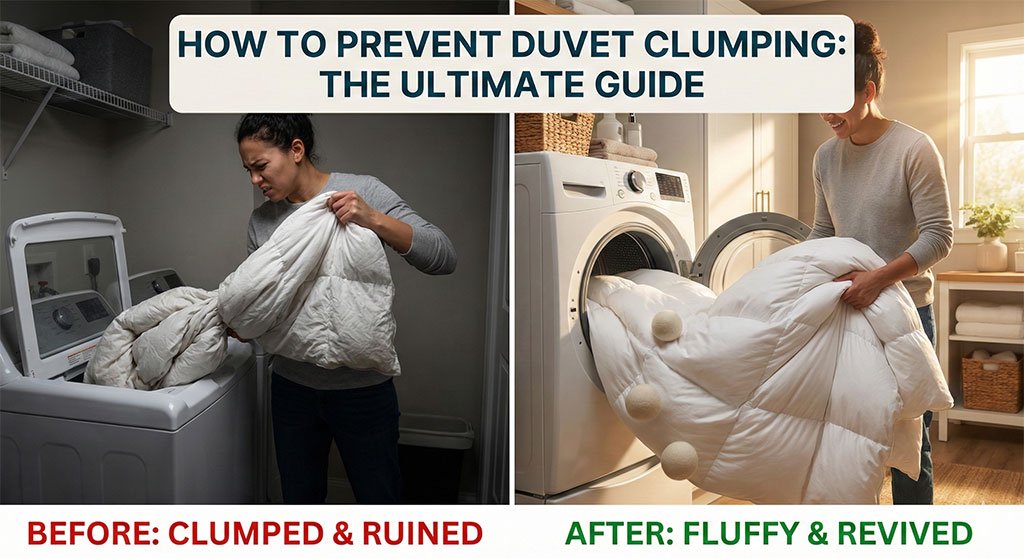Dishes may not get thoroughly clean in a dishwasher without soap. Soap is essential for breaking down and removing grease and food particles.
Dishwashers have become a staple in modern kitchens for their convenience and efficiency in cleaning dishes. While they do an excellent job at sanitizing dishes with hot water and rinsing away remnants of food, the effectiveness of a dishwasher significantly diminishes without dishwasher soap.
The detergent’s role is pivotal; it contains specific enzymes and chemicals designed to break down oils, grease, and stuck-on food, which water alone cannot always achieve. Users rely on dishwashers to ensure their kitchenware is not just visibly clean but also hygienically safe. It’s important to note that while a dishwasher can rinse dishes with hot water, the absence of soap will likely leave them with residue and without the desired level of cleanliness.
:max_bytes(150000):strip_icc()/Baking-Soda-Dish-Detergent-3x2-1-c469fe9179e24a5496f53a99b9dd6c65.png)
Credit: www.allrecipes.com
Table of Contents
The Role Of Soap In Dishwashing
Dishes sparkle and kitchen counters shine, often because of one hero: soap. This agent is key in any dishwashing saga. We might wonder, “Can dishes truly become clean without this ally?” Let’s dive into the functionality of soap and its pivotal role in dishwashing.
How Soap Interacts With Water And Grease
Soap performs a bit of magic when it meets water and grease. Its molecules act like a bridge. One end of the soap molecule loves water; the other end – grease. Here’s how this interaction unfolds:
- Soap decreases water’s surface tension, so it can spread and wet surfaces better.
- Grease-fighting ends of soap molecules cling to oily dirt.
- Water-loving ends stay in the water, forming spherical shapes called micelles.
- These micelles trap the dirt and allow it to rinse away.
This process lifts grease off dishes and mixes it with the water, washing it away.
The Science Behind Soap’s Cleaning Power
Soap’s power lies in its science. Here’s a simple breakdown:
Soap Component | Function |
|---|---|
Hydrophobic Tail | Grabs dirt and oil |
Hydrophilic Head | Bonds with water |
Micelle Formation | Encapsulates dirt |
Surface Tension Reduction | Improves water’s ability to clean |
Chemical reactions create an attack on dirt that water alone can’t match. The process ensures a thorough clean. For dishes to sparkle without soap, the water must overcome surface tension and grease. It’s a hard task without the science of soap.
Dishwashers: A Modern Convenience
Dishwashers have revolutionized how we clean our dishes. Gone are the days of scrubbing each plate by hand. These machines promise spotless tableware with minimum effort. But can they work without soap? Let’s dive into the evolution of dishwashers and how they work.
Evolution Of The Dishwasher
From their inception in the 1880s, dishwashers have evolved tremendously. Early models were hand-cranked, while today’s versions boast advanced features.
- 1880s: Hand-operated dishwashers introduced
- 1920s: Electric motors improve performance
- Modern times: Smart tech adds convenience
How do dishwashers work?
How Do Dishwashers Work?
Dishwashers clean by spraying hot water and soap on dishes. This mix removes food particles and sanitizes your tableware.
Step | Process |
|---|---|
1 | Add dishes and soap |
2 | Water heats up |
3 | Water and soap spray |
4 | Rinse with clean water |
5 | Dry dishes |
No Soap, No Problem?
No Soap, No Problem? Imagine this: You’re about to start the dishwasher, but then you notice you’re out of soap. Do you postpone the chore? Or can dishes still get clean without that sudsy helper? Let’s explore whether skipping the soap can still result in sparkling dishes.
Cases Of Soap-free Dishwashing
Sometimes, you might find yourself without dishwasher soap. Maybe the store is closed, or you forgot to restock. But life doesn’t pause for dirty dishes! Here’s what happens if you run the dishwasher without soap:
- The hot water sprays onto the dishes, removing some surface grime.
- Grease and tougher residues might not wash away completely.
- You may avoid soap scum, but stubborn stains will likely remain.
Surprisingly, a soap-free cycle can partially clean your dishes. But will they be spotless? Not quite.
Understanding The Limitations
Without soap, a dishwasher’s power diminishes. Here’s what you can expect:
Expectation | Result Without Soap |
|---|---|
Eco-friendly Wash | Less chemicals in the water, but mediocre cleanliness. |
Sanitized Dishes | High heat may kill germs, but it’s not a guarantee. |
Shiny Finish | Dishes dry but may sport water spots and leftover bits. |
It’s essential to know the limitations of bypassing soap. While you’ll get some level of clean, a dishwasher’s true power partners with soap to tackle grease, stains, and bacteria.

Credit: www.reddit.com
Mechanical Action Vs. Detergents
Diligent dishwashers wonder about soap-free cleaning. We’ll explore the battle between mechanical action and detergents.
The Effectiveness Of Hot Water And Spray Arms
Hot water is the muscle in your dishwasher. It melts away grime and kills germs. Dishwashers use spray arms that rotate, aiming hot jets to reach every corner. Let’s break down their effectiveness:
- Temperature: High heat can dissolve food particles.
- Pressure: The force from spray arms can loosen debris.
- Coverage: Arms rotate to cover all dishes evenly.
Without soap, this mechanical action does its best to clean. Yet, certain stains need more.
How Detergents Enhance Mechanical Cleaning
What happens with detergents in the mix?
Function | Benefit |
|---|---|
Break Down Grease | Grease slides off with ease. |
Remove Stains | Stains get lifted and gone. |
Prevent Spots | Glasses sparkle, sans spots. |
Chemicals in detergents attack food remains in ways water alone can’t. They break bonds between dirt and dish. Thus, mechanical action and detergents together assure ultra-clean results.
Natural Alternatives To Detergent
Ever wondered if dishes can get clean in the dishwasher without any soap? You’re not alone. Many people seek natural alternatives to detergent. Whether it’s for health, cost, or environmental concerns, home remedies for dishwashing have gained popularity.
Home Remedies For Soap-less Washing
Running out of dishwasher soap doesn’t mean you have to postpone cleaning your dishes. You can use items from your pantry. Here’s a list of soap-free solutions:
- Baking Soda: A natural abrasive that helps in cleaning and deodorizing.
- Vinegar: Cuts grease and leaves dishes sparkling.
- Lemon Juice: Disinfects and removes stains.
Mix these substances with water in your dishwasher’s detergent compartments for best results.
Pros And Cons Of Natural Alternatives
Pros | Cons |
|---|---|
Environmentally friendly | May not clean as effectively as soap |
Non-toxic and safe for sensitive skin | Could leave spots or film on dishes |
Readily available and cost-effective | Varied results depending on water type and temperature |
Natural alternatives often provide a safer cleaning process. Yet, their cleaning power might fall short of commercial detergents.
Impact Of Skipping Soap On Dishwasher Performance
Navigating the waters of dishwasher performance often comes with the question: can dishes be clean without soap? The answer isn’t just about the spotlessness of your ceramics – it’s about the wellbeing of your trusty machine too. Let’s uncover the ripple effects of bypassing detergent during your rinse cycle.
Potential For Buildup And Maintenance Issues
Without soap, unwanted guests make themselves at home in your dishwasher. Food particles, Grease, and mineral deposits build up over time.
- Sprayers and filters clog, straining the system.
- Water can’t flow freely, leading to subpar cleaning results.
- Regular maintenance calls become a necessity, eating into your pockets.
In short, skipping soap sets the stage for a maintenance drama you’d rather avoid.
Long-term Effects On Machine And Dish Cleanliness
Without Soap | Long-term Impact |
|---|---|
Dishwasher’s Interior | Loses its shine, becomes a den for grime buildup. |
Dish Cleanliness | Sanitation falters, and stains can turn into permanent souvenirs. |
Odors | Uninvited, they linger longer, turning your kitchen into an unwanted scent-scape. |
The essence of sparkle fades, as does the efficiency of your treasured appliance. A dishwasher’s lifespan shortens when soap isn’t in its daily swim. Dishes lose their gleam, while the heart of your kitchen itches for a clean it cannot achieve alone. Stick to soap – your dishes and dishwasher will thank you.
Hygiene Considerations
Dishwashers work hard to get dishes sparkly clean. Using soap is a key step in this process. Many wonder if dishes can still be clean without it. The focus here is on hygiene.
Risks Of Bacteria And Food Residue
Scraps of food and grime often cling to plates and utensils. Without soap, not all of this gets washed away. Remaining bits can house bacteria.
- Growth of bacteria remains a risk.
- Dishes may look clean but could be unsafe to use.
- Smells can linger, leading to an unpleasant experience.
Importance Of Sanitization
Soap in dishwashers does more than clean. It sanitizes. This kills germs and ensures safety. Clean dishes should also be germ-free.
Without Soap | With Soap |
|---|---|
Dishes might not be germ-free | Dishes are sanitized |
Risk of illness increases | Protects health effectively |
Professional Insights And Recommendations
Ever wondered if dishes can get clean without soap in the dishwasher? Let’s dive into what experts say about this common household query.
Advice From Appliance Experts
Experts caution against running a dishwasher without detergent. The appliance is designed to work with detergent to effectively remove food, grease, and other debris. Without it, cleaning power drops significantly, potentially leaving residues and harmful bacteria.
Here’s what they suggest:
- Use recommended detergent – Ensures proper cleaning and machine care.
- Rinse dishes first – Helps remove major debris before washing.
- Don’t skip agent – A rinse aid can help prevent spots and film.
- Avoid overloading – Ensures water and detergent reach every dish.
Best Practices For Optimal Dishwashing
To maximize cleanliness, here are best practices:
- Select the right cycle – Heavier cycles for dirtier items.
- Organize efficiently – Place items for optimal spray coverage.
- Regular maintenance – Clean filters and seals to maintain performance.
Remember, consistent use of detergent is crucial for hygiene and machine longevity. Skipping it might save on soap, but can lead to long-term issues and ineffective cleaning.
:max_bytes(150000):strip_icc()/regular-dish-soap-in-dishwasher-1907646-04-25d53cf519a84cbb838b71232cd93c2c.jpg)
Credit: www.thespruce.com
Frequently Asked Questions
Do Dishes Get Clean In The Dishwasher Without Soap?
Dishes may not fully clean without soap in a dishwasher. Soap helps remove grease and sanitize, enhancing the effectiveness of the wash cycle.
Do Dishwashers Always Need Soap To Sanitize?
Dishwashers need soap to effectively clean and sanitize dishes. Without soap, they may not remove all food and bacteria.
Can I Just Put Dirty Dishes In The Dishwasher?
Yes, dirty dishes can go into the dishwasher, but remove large food pieces first to prevent clogging. Avoid overloading for optimal cleaning.
How Do I Get The Cleanest Dishes In My Dishwasher?
For the cleanest dishes, load properly, use quality detergent, choose the right cycle, maintain a clean dishwasher, and follow manufacturer’s instructions.
Bottom Line
Experimenting with dishwashers has revealed a surprising truth: dishes can emerge somewhat clean even sans soap. This isn’t a recommended practice, though, as various factors like water hardness and food residue impact the results. For sparkling results, stick with detergent.
Remember, the right soap makes all the difference in your dishwasher’s effectiveness. Cleaning without it? Best reserved for necessity, not routine.


